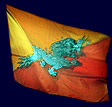 |
Bhutan Politics The King |
|
|
|
|
Champion
of the Earth
|

|
SUMMARY
OF ACHIEVEMENTS OF UNITED NATIONS ENVIRONMENT PROGRAMME (UNEP)
2005
CHAMPIONS OF THE EARTH AWARD WINNERS |
April
12, 2005
 |
Druk Gyalpo - Dragon King - Jigme Singye Wangchuk of Bhutan
| Bhutan,
a kingdom under the reign of Druk Gyalpo (Dragon King) Jigme Singye Wangchuck,
has the environment as the centrepiece in its constitution and all of its
national development plans. Bhutan has an excellent track record in the
field of environment - more than 74% of its land is under forest cover
and 26% of this cover is protected areas. |
|
The
Paro Resolution on Environment and Sustainable Development, declared in
May 1990, states that Bhutan's natural resources base is central to a sustainable
and prosperous future of the country. The development of a National Environmental
strategy that will ensure the careful stewardship and sustained use of
these natural resources was urged. Development should be pursued
on a middle path thus ensuring that new industries, new agricultural markets
and new forestry products will be carefully developed with respect to their
broader environmental ramifications.
Bhutan's
success in preserving its natural resources has been possible because of
the country's recent entry into the economic development process, as well
as the Buddhist faith, an important factor in all aspects of Bhutanese
life.
Bhutan
is developing a National Environment Secretariat and an Environmental Trust
Fund, as well as new legislation and policies to ensure sustainable utilization
of resources, promote community involvement in environmental activities,
improve land use planning, and integrate traditional with modern natural
resource use practices. Additionally, Bhutan will attempt to base economic
growth on environmentally sound technologies, expand environmental education,
and develop a family planning policy.
Bhutan
boasts the most varied habitats and a rich array of animal and plant species.
Under Bhutanese law, 60% of the kingdom will remain forested for all time.
There is currently an astonishing array of plants - more than 5500 species,
including over 300 medicinal strains. There are 165 species of mammals,
including many rare and endangered animals such as the golden langur, the
snow leopard and the red panda. To date, 770 species of birds have been
recorded, including the rare and endangered black-necked crane.
A
progressive integrated conservation and development programme reconciles
the needs of the community with environmental protection, the foundation
of Bhutan's entire economic ethos. National parks sustain important ecosystems
and have not been developed as tourist attractions. In many cases one would
not even be aware that one is entering or leaving a protected area.
Bhutan
ranks in the top 10% of countries with the highest species density on earth,
and it has the highest fraction of land in protected areas as well as the
highest proportion of forest cover of any Asian nation.
Development
in Bhutan is guided by principles that emphasise preservation of both natural
and cultural heritage, as well as sustainability from subsistence to a
more modern economy. Renewable natural resources remain the most important
sector, and in 1998 contributed 36.1% of the Gross Domestic Product. Thus,
short-term profit at the expense of long-term loss of natural heritage
is not for Bhutan. Its cautious approach puts conservation first and relegates
economic benefits to a secondary role.
By
the late 1970s, Bhutan had established an extensive system of protected
areas. Since then, among other actions, the nation has:
 |
 Established
the Bhutan Trust Fund for Environmental Conservation to provide long-term
financing for conservation; Established
the Bhutan Trust Fund for Environmental Conservation to provide long-term
financing for conservation;
 Revised
and identified nine protected areas representative of Bhutan's diverse
ecosystems, comprising 26% of land area; Revised
and identified nine protected areas representative of Bhutan's diverse
ecosystems, comprising 26% of land area;
 Established
the Nature Conservation Division within the Department of Forestry Services,
with a mandate to oversee and manage protected areas; Established
the Nature Conservation Division within the Department of Forestry Services,
with a mandate to oversee and manage protected areas;
 Pledged
to maintain, in perpetuity, at least 60% of land as forests; Pledged
to maintain, in perpetuity, at least 60% of land as forests;
 Enacted
the National Plant Quarantine Act (1993) to control the movement of diseases,
insects and other pests; Enacted
the National Plant Quarantine Act (1993) to control the movement of diseases,
insects and other pests;
 Included
provisions for establishing protected areas and conservation regulations
in the Forest and Nature Conservation Act (1995); Included
provisions for establishing protected areas and conservation regulations
in the Forest and Nature Conservation Act (1995);
 Ratified
the international conventions on Biological Diversity and Climate Change
(1995); Ratified
the international conventions on Biological Diversity and Climate Change
(1995);
 Adopted
the National Biodiversity Action Plan (1998); Adopted
the National Biodiversity Action Plan (1998);
 Adopted
the Middle Path, a National Environmental Strategy (1998); Adopted
the Middle Path, a National Environmental Strategy (1998);
 Initiated
a National Biodiversity Programme to oversee ex-situ conservation and sustainable
utilisation of biodiversity (1998); Initiated
a National Biodiversity Programme to oversee ex-situ conservation and sustainable
utilisation of biodiversity (1998);
 Legislated
environmental assessments for all development and industrial activities
(2000); Legislated
environmental assessments for all development and industrial activities
(2000);
|
|
Guiding
principles for the future development of Bhutan are complemented by a unifying
concept the distinctly Bhutanese notion of Maximizing Gross National
Happiness (MGNH). The aim of MGNH is to promote important values
and to provide direction to the Kingdom's long-term development, and the
concept must be translated into tangible goals. Towards this end, five
themes are identified and provide powerful objectives for steering the
process of change: human development, the promotion and preservation of
culture and heritage, balanced and equitable socio-economic development,
good governance, and environmentally sustainable development.

|
Source:
UNEP's Division of Communications and Public Information
NEW
YORK/NAIROBI, 19 April 2005 |
| Links |
 |
 |
 |
External
links |
|



